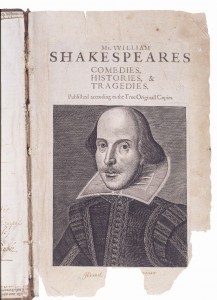As you enter the darkened room, a 1623 Shakespeare First Folio is to your right. Enigmatic scraps of a poem by Sappho, circa 2nd century A.D., are to your left. And all around you the wonders of the world: weighted with heavy seals, a 1217 “engrossment” of the Magna Carta is nearby (it was reissued under Henry III); so is a 1455 Gutenberg Bible. In the corner of one glass case – an exquisite 18th-century miniature scroll of the Bhagavad Gita, which shines like a cache of jewels, somehow pressed and rolled into paper.
“I have always imagined that Paradise will be a kind of library,” Jorge Luis Borges famously said. And here, in the Bodleian Library’s current exhibition, “Treasures of the Bodleian,” 30 Sept. – 23 Dec. 2011, everyone could see that, well, he had a point. The exhibition anticipates a permanent gallery in the Weston Library in 2015. The exhibition shows some of the Bodleian’s rarest, most important, and most evocative rarities.
To wit: In a corner, a single page of Mary Wollstonecraft Shelley‘s Frankenstein describes the ominous night of the creature’s creation. Her scrawled text is corrected and amended by her husband, the poet Percy Bysshe Shelley. Other handwritten manuscripts are the work of Jane Austen, John Donne, and Gerard Manley Hopkins. Others are the work of a brush rather than a nib: an exquisite 17th-century picture scroll of the sad Tale of Urashima, a classic Japanese fairy tale which I had read as a child.
For Sir Thomas Bodley, who basically created the museum that opened its doors in 1602, the Shakespeare first folio did not seem like the greatest find. According to the exhibition guide, he “would likely have dismissed this as one of the ‘idle books, and rife raffes’ that had not place among the Library’s predominantly theological collections.”
The volume left the library under mysterious conditions in 1674, and resurfaced only in 1905. By that time, “the Bodleian was prepared to pay the unheard-of sum of £3,000 to buy back ‘its original long-lost copy of the First Folio of Shakespeare.'”
I visited the exhibition in the company of my friend, Oxford’s Eliza Tudor, and we gravitated towards our favorites. Hers seemed to be J.R.R. Tolkien‘s brilliant golden watercolor of Bilbo Baggins, rendered invisible by a magic ring, as he converses with a dragon. She also took a liking to the Selden map of China, from the Ming era – the earliest Chinese map to show not only shipping routes, but also to depict China as part of a greater East and Southeast Asia. And for me … well, what a choice! Perhaps I’ll plump for one of the earliest editions of Dante‘s Divine Comedy, fully illustrated, made within decades of his death (see video below).
But there are littler treasures, too – Mohandas Gandhi wrote to his friend, the Anglican missionary Charles Andrews, in a 1932 prison letter exhibited in the collection: “I can therefore never say beforehand what will occupy my attention exclusively or for the most part at a given moment and since a civil resister bargains for the punishment he receives for his resistance, he must not fret over it. Therefore and to that extent I am content with my lot.”

Letter from an Egyptian boy to his father, 2nd or 3rd century A.D. Copyright Bodleian Libraries, University of Oxford
Eliza arrived with her young son Fabian, who was mildly ill and did not attend school that day. His own choice was no surprise. The exhibit that intrigued him the most was one of the earliest – about the same era, perhaps a little later, as the Sappho fragments: on a sheet of papyrus, an Egyptian schoolboy Theon complains to his father:
Theon to his father Theon, greetings. A nice thing to do, not taking me with you to the city. If you refuse to take me with you to Alexandria, I shall not write you a letter or speak to you or wish you good health. So: if you go to Alexandria I shall not take your hand or greet you ever again. If you refuse to take me, this is what happens. And my mother said to Archelaos, “He’s upsetting me, take him away!” A nice thing to do, sending me these grand presents, a hill of beans. They put us off the track that day, the 12th, when you sailed. Well then, send for me, I beg you. If you don’t send for me, I shan’t eat, I shan’t drink. There! I pray for your health.
Tags: Charles Andrews, Dante, Gerard Manley Hopkins, J.R.R. Tolkien, Jane Austen, John Donne, Jorge Luis Borges, Mary Wollstonecraft Shelley, Mohandas Gandhi, Percy Bysshe Shelley, William Shakespeare




